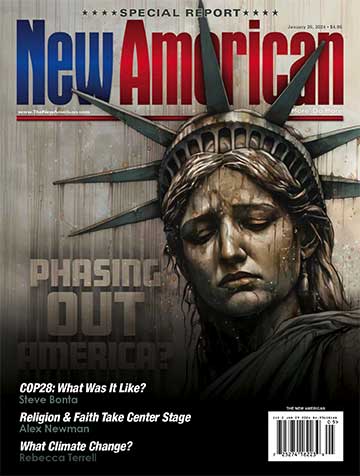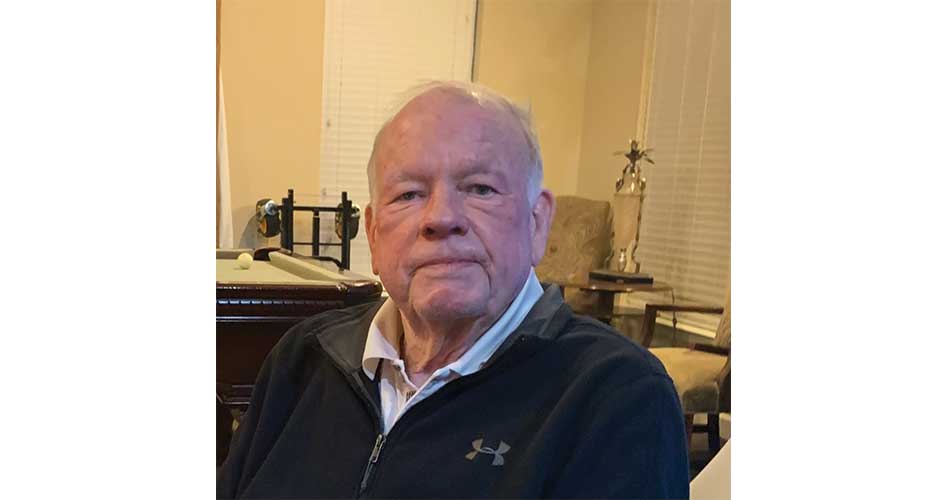The Final Flight of Ed Hiserodt, Contributor to The New American
by Rebecca Terrell
Ed Hiserodt, longtime contributor to The New American, “slipped the surly bonds of Earth” the morning of November 28. He was waiting for a colleague to pick him up for a business lunch later that day. The night before, he had spoken with one of his daughters about driving out for a visit to her home in Colorado. And just days earlier he had sent an email to family and friends about converging at his home in Arkansas to witness next April’s total solar eclipse.
But God had other plans, and after 84 years of (more or less) steadily beating, one of the happiest hearts to ever grace Earth suddenly stopped.
Oh! I have slipped the surly bonds of Earth
And danced the skies on laughter-silvered wings.
Sunward I’ve climbed, and joined the tumbling mirth
Of sun-split clouds — and done a hundred things
You have not dreamt of — wheeled and soared and swung
High in the sunlit silence. Hov’ring there,
I’ve chased the shouting wind along, and flung
My eager craft through footless halls of air.Up, up the long, delirious, burning blue
I’ve topped the wind-swept heights with easy grace,
Where never lark, nor even eagle flew;
And, while with silent, lifting mind I’ve trod
The high untrespassed sanctity of space,
Put out my hand, and touched the face of God.
— “High Flight” by John Gillespie Magee, Jr.
It was the same heart that, eight years before, was in jeopardy, his doctors had warned. They gave Ed between five and 10 years. Soon after that prognosis, he asked me to help write his obituary. It was a bittersweet task, because not only have we been collaborators on many articles over the past 15 years, but he has also been a dear friend and second father to me for more than 40.
He tackled the job with his characteristic optimism, and for an opening borrowed a phrase from the poem “High Flight” — the same line as that which began this tribute article. It was a favorite verse of his since he had so many times experienced the exhilaration of flying his own plane.
After recording the requisite family lineage, we composed the following:
Ed’s undying loyalty to the Crimson Tide began with his college career at the University of Alabama in Tuscaloosa where he joined Sigma Chi Fraternity and went on to earn a B.S. in Aerospace Engineering in 1962. After graduating and earning a private pilot’s license that year, he worked in a number of engineering capacities including as a NASA contractor on the Saturn V project in Huntsville from 1962 until 1966, and as an electrical manufacturer’s representative for Ransom Sales in Memphis. In 1970 he moved to Little Rock, Arkansas, and in 1983 founded Controls & Power, an engineering representative firm for electrical control manufacturers, of which he was president for the remainder of his life. Ed prided himself on achieving his bucket list items of owning his own plane and making a hole-in-one. But he never got around to climbing Mount Everest. (Too much trouble.)
Passion for liberty was his raison d’etre, and he lived a life supporting those causes that restore and safeguard the freedoms we inherited from those who died to ensure we would have them. A life member of The John Birch Society and former chairman of the American Conservative Union, his special interest rested in promoting nuclear energy and exposing the myth of so-called “renewables.” As such, he was a member of Scientists for Accurate Radiation Information and Environmentalists for Nuclear Power. A longtime contributor to The New American magazine on science and energy issues, in 2005, he penned his magnum opus, UnderExposed: What If Radiation Is Actually Good for You?, currently in its second printing of the English edition and which has also been translated into Dutch and French.
Neither of us was completely satisfied with the result. There was too much we had to omit for the sake of brevity. But we cut it short, leaving space for visitation and funeral information. When finished, he smiled. “It’s been a wonderful ride!” he said, with a shake of his head and a twinkle in his eye.
It was a humble understatement. What the obituary couldn’t possibly convey was how much his children and grandchildren adore him. Nor did it mention his affinity for good music. The line about Mount Everest only hinted at his madcap sense of humor. Known among industry colleagues as Mr. Wizard (a fact his family learned only after his passing), his personal humility would never have allowed remarks of his engineering prowess and uncanny ability to frame complex scientific concepts in accurate yet understandable terms.
But these characteristics revealed themselves in spades when notice of Ed’s death reached those lucky enough to have known him. Here is a small sampling of their comments:
• “Thank you, Ed, for everything you did for a better world, and to support the many benefits of radiation and clean nuclear energy. We won’t forget you.”
• “Your book, Underexposed, opened the eyes of many about the health benefits of radiation. Environmentalists for Nuclear Energy will remember you and continue to promote your work.”
• “Ed’s book became a standard for public education in the English, Dutch and French-speaking worlds. I encourage everyone to read it for understanding of important science and in memory of an outstanding husband, father, educator and engineer.”
• “I will always remember Mr. Ed as a person who was young at heart and enjoyed life! Who else has disco balls and a DJ at their 80th birthday?!”
• “What made Ed a genius was his intellect combined with his love of reading, learning, mentoring, and meeting a challenge, gathering friends and like-minded colleagues along the way.”
• “His pioneering activity in variable frequency drives opened the development of lakeside property and other problem areas of sewage collection across the U.S. and the world.”
• “Only Ed (in bermuda shorts) would be in Minnesota during a winter storm working on a pump with the electric crew. They managed to get it up and running, maybe with a little frostbite.”
• “I will always have such fond memories of Mr. Wizard. He was a kind man who always took time to mentor and explain sometimes complicated things in layman’s terms. He truly was a genius, but he was always humble — a rare combination.”
• “Sitting in front of a control panel in a manufacturer’s facility, in a muddy jobsite, in a 100-degree pump room, he was always teaching. Any interested person became his ‘student,’ and they will never forget Ed and the profound effect he had on their lives.”
Many more tributes could be added to these, yet even all together they could not honestly do him justice. As for my own contribution, all I can say is that no one could ever possibly replace him. It is my prayer that in his own, final “high flight,” not only has he truly “touched the face of God,” but he lives forever in that Beatific Vision.
Farewell, my beloved friend, until we meet again.


